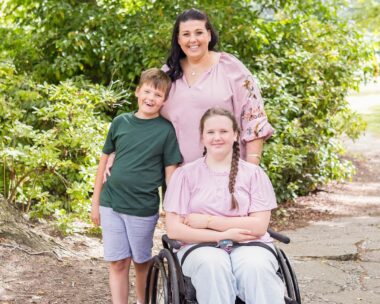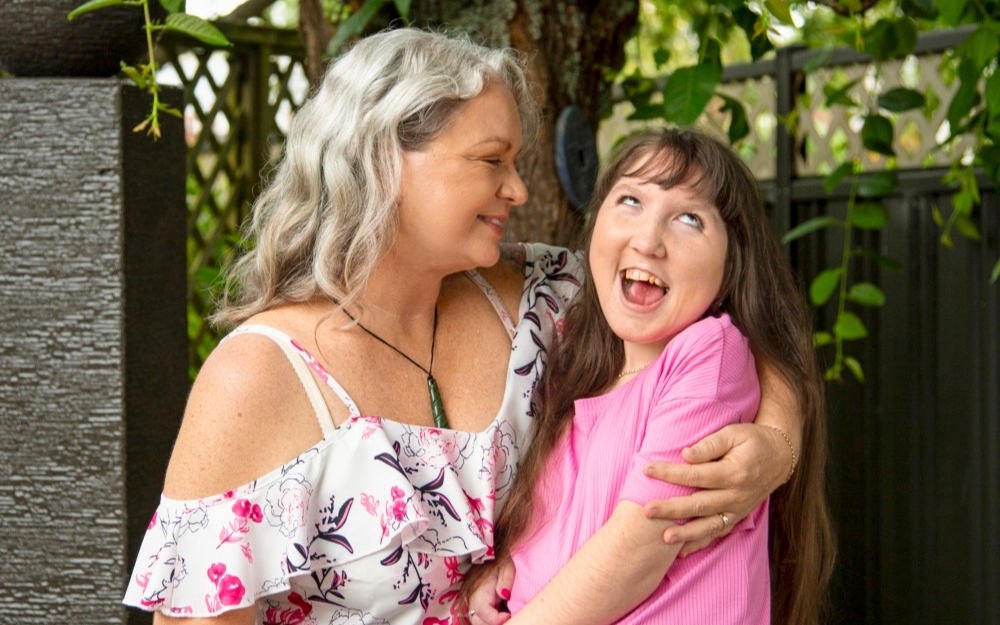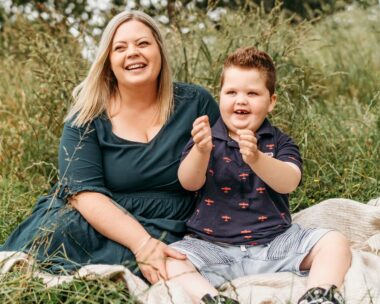Every time someone sings Twinkle Twinkle Little Star or her big brother plants a kiss on her forehead, little Brooklyn Cassidy breaks into the biggest smile.
Despite being born with Rett syndrome, a rare neurological disorder seen almost exclusively in females, and which renders the three-year-old “trapped in her own body”, Brooklyn still experiences a full range of emotions and understands more than she can express.
Take bedtime, for example. When her parents, Christina and Isaiah Cassidy, who share a strong Christian faith, say a nightly prayer with Brooklyn and son Kingston, five, they’re amazed when their almost non-verbal daughter resiliently tries her best to be included.

“Sometimes she looks intently at each of us and tries to mumble, and then we hear her say ‘Amen’. It’s so cool when those moments happen,” smiles her mum from their West Auckland home. She added that through the night, Brooklyn often babbles away and cracks herself up. “In her mind, she has a lot to say!”
Brooklyn’s diagnosis
Sharing their story with the Weekly during Rare Disorders Awareness Month, the couple describe Rett syndrome as a mix between Parkinson’s disease, epilepsy and cerebral palsy. There are currently between 40-60 Kiwi girls affected by the genetic condition. For Brooklyn, it means she can’t speak, sit up or move on her own and struggles with seizures.
Christina, 35, says they first noticed something wasn’t quite right when Brooklyn was eight months old. She explains, “She was always fidgety and her eyes would often roll back. I’m an early childhood teacher, so I’m used to the range of different growth patterns in babies. But Brookie just wasn’t hitting her milestones.

“She was sitting up trying to feed herself and then regressed. Doctors weren’t helpful and told us she’d grow out of it. Or that because her birth was normal, she was normal.”
After a raft of blood tests and electroencephalography (EEG) scans to measure the electrical activity in her brain, a neurologist at Starship Children’s Hospital, Dr Cynthia Sharpe, pushed for genetic testing.
“But because everything was backed up from Covid, we didn’t hear anything for two years,” recalls Isaiah, 32. “Finally receiving the Rett’s diagnosis – a one in 15,000 statistic – was pretty much the worst outcome for us.
“We were told she’d be lucky to make it to 20 and after childhood, we’re going to watch her deteriorate. Knowing I’ll probably outlive my daughter is such a hard thing to wrestle with.”
But, for now, the couple is hopeful with continued support of devoted movement therapist Ildi Dittrich from Early Movement Therapy, Brooklyn can build muscle memory and potentially learn to walk.
She’s also on a waiting list for a computer which may help her to communicate with her eyes.

Is there a cure?
While there is no known cure, the first drug to treat Rett syndrome, Trofinetide, was released in America last year. In fact, the molecule that led to its development was created here at the University of Auckland. Professor Dame Margaret Brimble led a small team of chemists to engineer it 20 years ago.
“Even though it was developed in New Zealand, the drug costs $300,000 per year and only stagnates the regression of the condition,” shares Isaiah.
Being a three-year-old as best she can
Brooklyn currently attends a preschool several days a week, aided by a support worker. Even though she’s often in a wheelchair, the other children involve her in their play and give her a sense of belonging.
“As adults, I don’t think we’re exposed enough to people who have very different needs and abilities,” points out Christina. “Watching her with the other children, it’s so impactful for their education in building empathy and their ability to advocate for others in the future.”

“Yeah, we don’t want her to be known as ‘the girl with Rett’s’, Isaiah added. We just want her to be Brooklyn Cassidy. Her mind and personality is the same as any other three-year-old’s, but it’s trapped.”
Supporting each other to raise and love Brooklyn, the proud parents share older brother Kingston is invaluable when it comes to comforting his sister.
“They have such a great bond,” says Christina. “He’s always looking out for Brookie. He offers her food, or hold her hand or find her a toy when she’s upset in the back of the car. Both our kids teach us so much.
March is Rare Disorders Awareness Month. Visit raredisorders.org.nz or rettsyndrome.org.nz for more info. To find out more about movement therapy, visit earlymovementtherapy.com.
 Photos: Carmen Bird
Photos: Carmen Bird


